
Max Roser
@maxroser.bsky.social
— Founder of Our World in Data
— Professor at the University of Oxford
Data to understand global problems and research to make progress against them.
— Professor at the University of Oxford
Data to understand global problems and research to make progress against them.
A big shift in technology.
The purple bars show the sales of cars powered by combustion engines in China.
In green, you see the rise of electric cars in recent years.
The purple bars show the sales of cars powered by combustion engines in China.
In green, you see the rise of electric cars in recent years.

October 24, 2025 at 6:34 AM
A big shift in technology.
The purple bars show the sales of cars powered by combustion engines in China.
In green, you see the rise of electric cars in recent years.
The purple bars show the sales of cars powered by combustion engines in China.
In green, you see the rise of electric cars in recent years.
What we die from vs. what we hear in the news.
Terrorism and homicides account for less than 1% of deaths, but for more than half of all media stories about death in the US — whether in the New York Times, the Washington Post, or Fox News.
Terrorism and homicides account for less than 1% of deaths, but for more than half of all media stories about death in the US — whether in the New York Times, the Washington Post, or Fox News.

October 11, 2025 at 9:41 PM
What we die from vs. what we hear in the news.
Terrorism and homicides account for less than 1% of deaths, but for more than half of all media stories about death in the US — whether in the New York Times, the Washington Post, or Fox News.
Terrorism and homicides account for less than 1% of deaths, but for more than half of all media stories about death in the US — whether in the New York Times, the Washington Post, or Fox News.
At Our World in Data, we spend much of our time counting deaths.
But it’s just as important to know the number of lives saved — even though it is harder to estimate and involves much larger uncertainty.
My Data Insight today includes this chart of some estimates.
But it’s just as important to know the number of lives saved — even though it is harder to estimate and involves much larger uncertainty.
My Data Insight today includes this chart of some estimates.

August 22, 2025 at 5:23 PM
At Our World in Data, we spend much of our time counting deaths.
But it’s just as important to know the number of lives saved — even though it is harder to estimate and involves much larger uncertainty.
My Data Insight today includes this chart of some estimates.
But it’s just as important to know the number of lives saved — even though it is harder to estimate and involves much larger uncertainty.
My Data Insight today includes this chart of some estimates.
Most electricity in the Netherlands now comes from renewables.
This is today's @ourworldindata.org Data Insight from my colleague @simonvanteutem.bsky.social.
All our Data Insights are here: ourworldindata.org/data-insights
This is today's @ourworldindata.org Data Insight from my colleague @simonvanteutem.bsky.social.
All our Data Insights are here: ourworldindata.org/data-insights
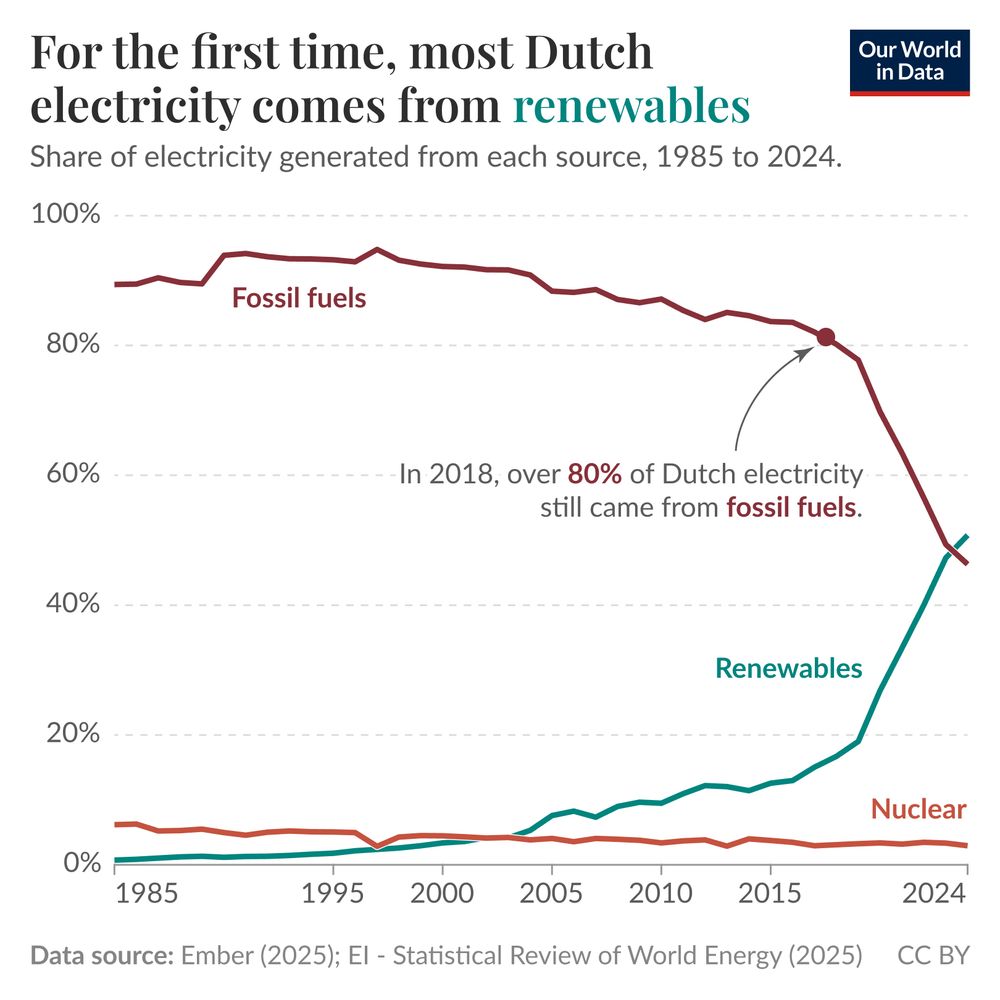
August 1, 2025 at 8:30 AM
Most electricity in the Netherlands now comes from renewables.
This is today's @ourworldindata.org Data Insight from my colleague @simonvanteutem.bsky.social.
All our Data Insights are here: ourworldindata.org/data-insights
This is today's @ourworldindata.org Data Insight from my colleague @simonvanteutem.bsky.social.
All our Data Insights are here: ourworldindata.org/data-insights
Every third car in Norway is now an electric car.
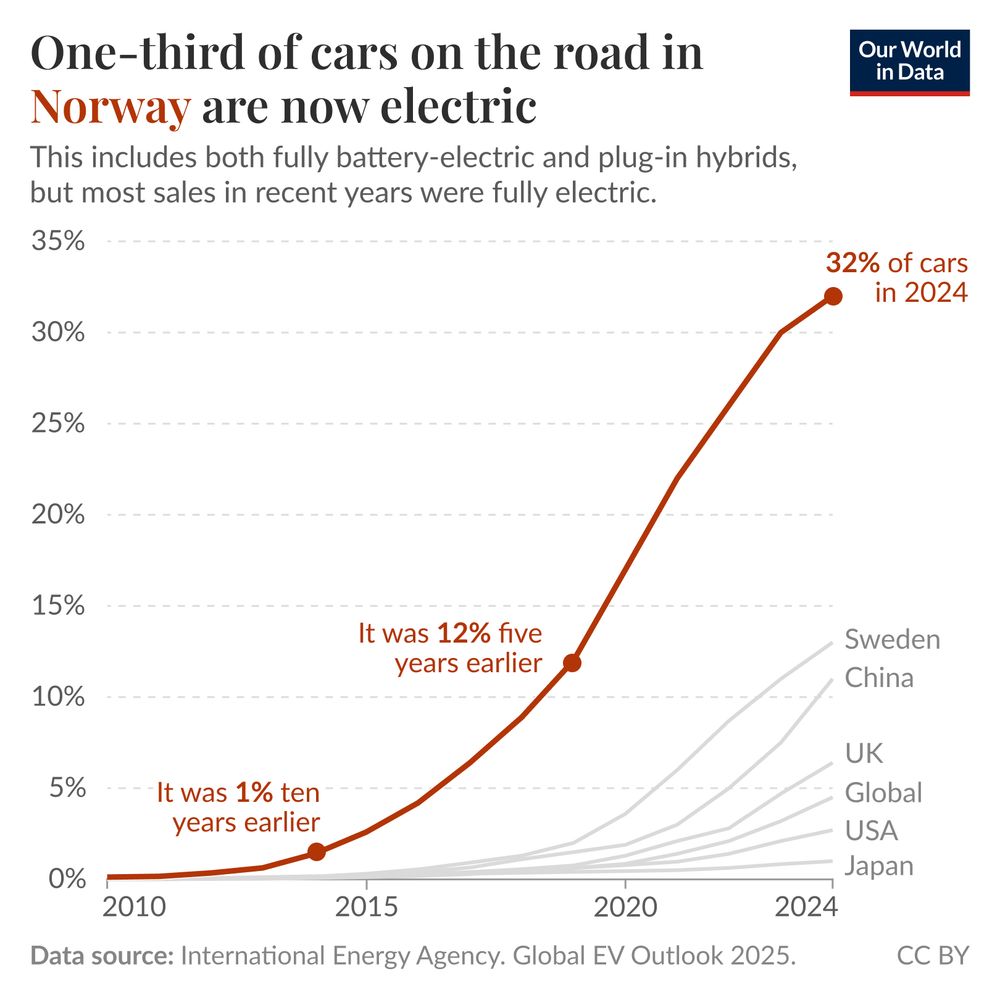
July 26, 2025 at 2:23 PM
Every third car in Norway is now an electric car.
At least since the mid-20th century, England has left mass hunger behind. How was this possible? How did English farmers prove Malthus wrong?
My 'Data Insight' on @ourworldindata.org today is about rising yields and falling hunger.
→ ourworldindata.org/data-insights
My 'Data Insight' on @ourworldindata.org today is about rising yields and falling hunger.
→ ourworldindata.org/data-insights
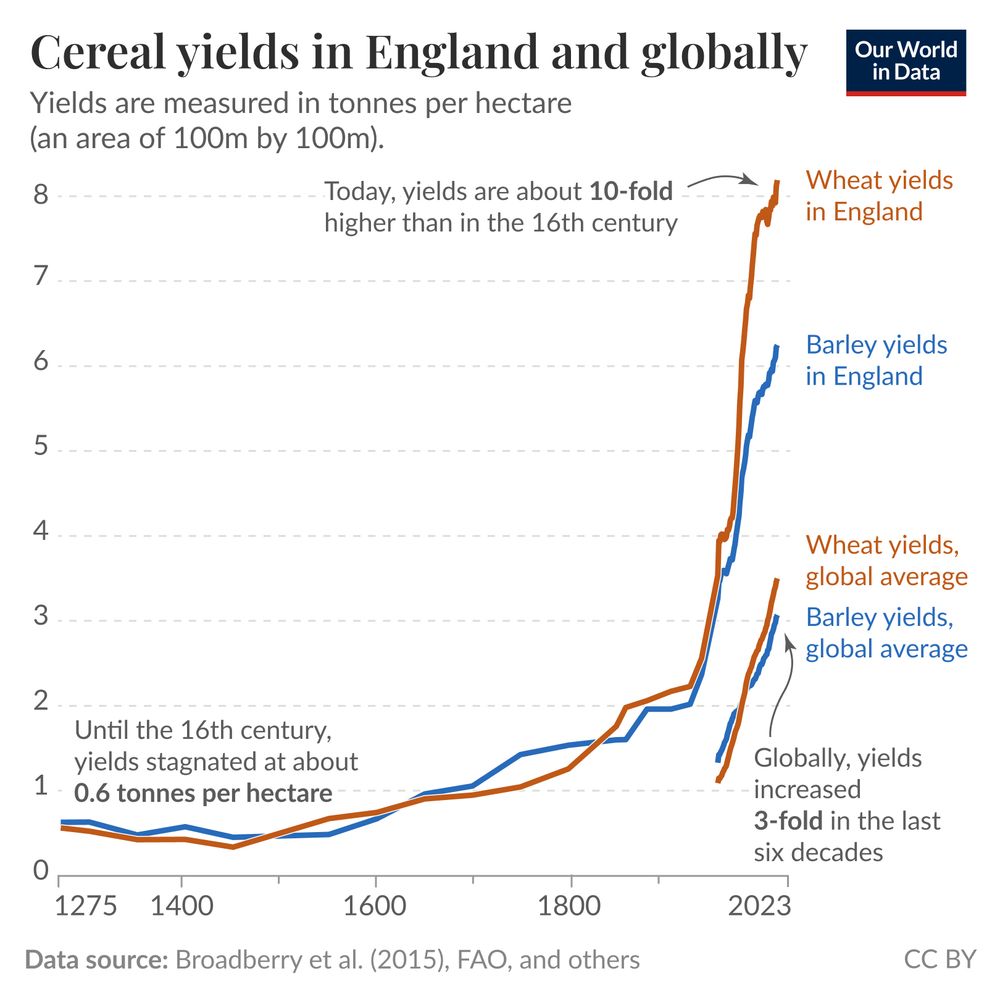
July 16, 2025 at 3:57 PM
At least since the mid-20th century, England has left mass hunger behind. How was this possible? How did English farmers prove Malthus wrong?
My 'Data Insight' on @ourworldindata.org today is about rising yields and falling hunger.
→ ourworldindata.org/data-insights
My 'Data Insight' on @ourworldindata.org today is about rising yields and falling hunger.
→ ourworldindata.org/data-insights
No, it's not the case that only China is responsible for the large decline in extreme poverty over the past decades.
We wrote about it recently: ourworldindata.org/data-insights/was-the-global-decline-of-extreme-poverty-only-due-to-china
We wrote about it recently: ourworldindata.org/data-insights/was-the-global-decline-of-extreme-poverty-only-due-to-china
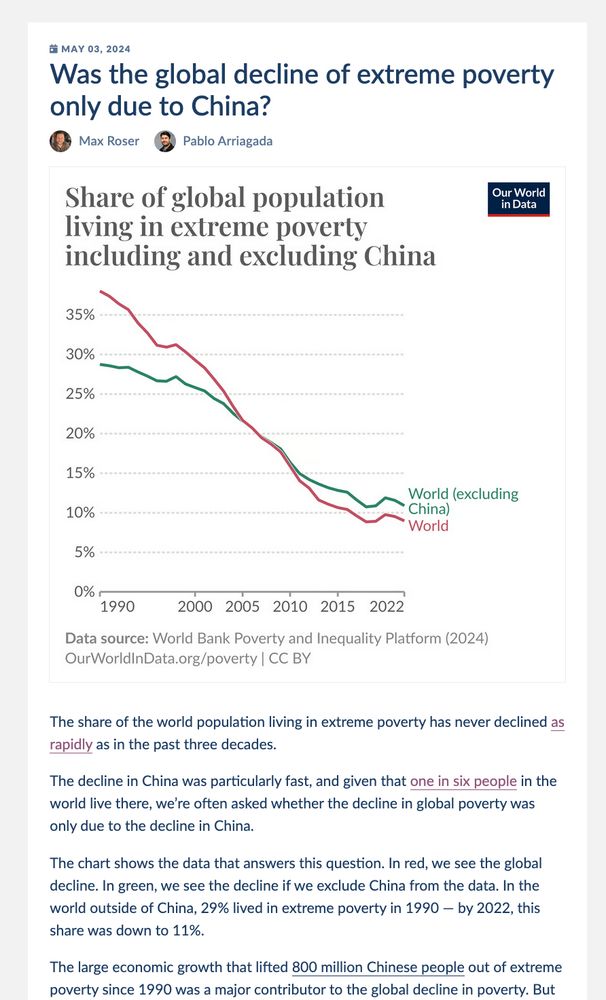
July 13, 2025 at 7:07 AM
No, it's not the case that only China is responsible for the large decline in extreme poverty over the past decades.
We wrote about it recently: ourworldindata.org/data-insights/was-the-global-decline-of-extreme-poverty-only-due-to-china
We wrote about it recently: ourworldindata.org/data-insights/was-the-global-decline-of-extreme-poverty-only-due-to-china
My latest Data Insight is about extreme poverty in South East Africa.
In Madagascar, Malawi, Mozambique, and Zambia, extreme poverty is not declining.
In Madagascar, Malawi, Mozambique, and Zambia, extreme poverty is not declining.
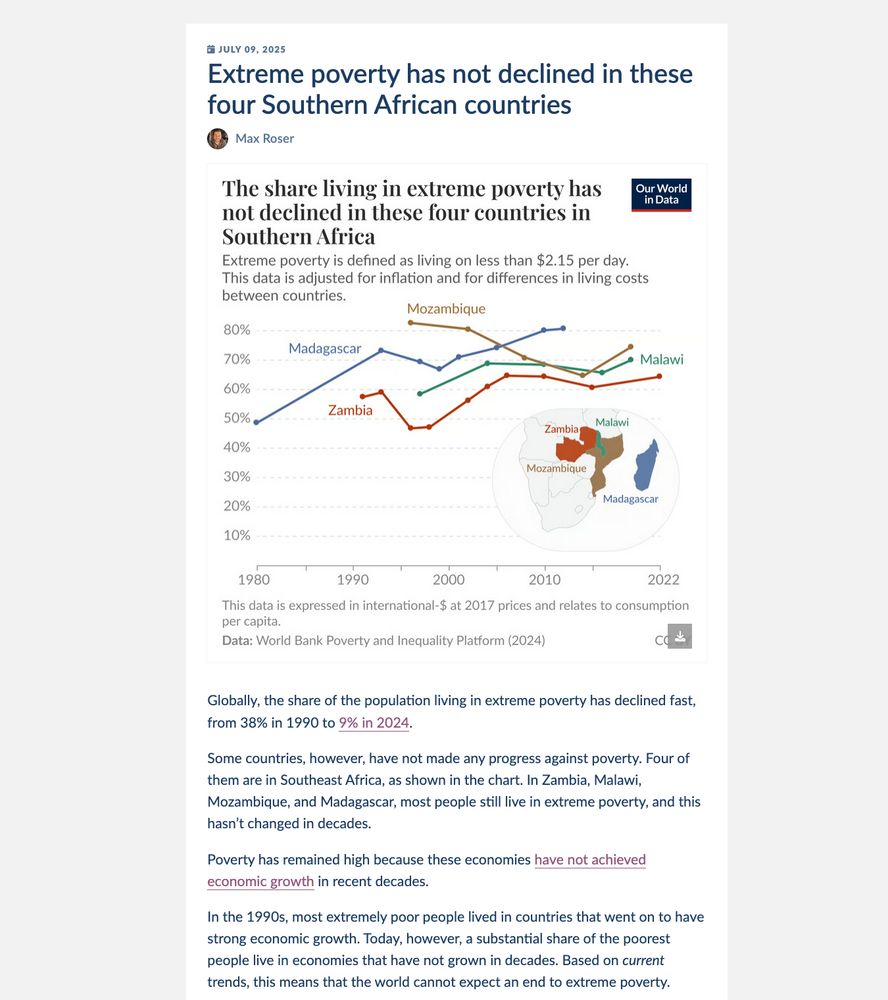
July 12, 2025 at 5:14 PM
My latest Data Insight is about extreme poverty in South East Africa.
In Madagascar, Malawi, Mozambique, and Zambia, extreme poverty is not declining.
In Madagascar, Malawi, Mozambique, and Zambia, extreme poverty is not declining.
In 2014, half of Greece's electricity was generated by coal.
A decade later, that share has fallen to just 6%.
A decade later, that share has fallen to just 6%.
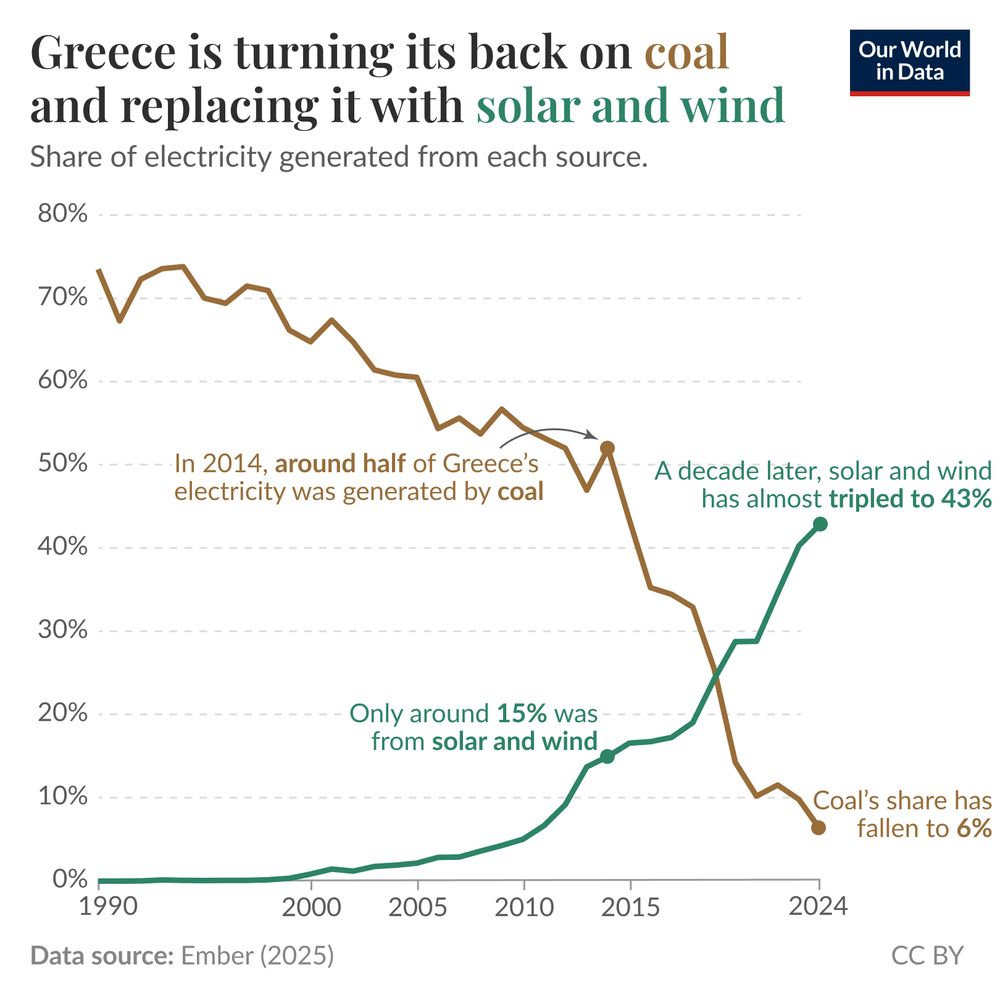
July 5, 2025 at 2:22 PM
In 2014, half of Greece's electricity was generated by coal.
A decade later, that share has fallen to just 6%.
A decade later, that share has fallen to just 6%.
My chart on the history of three infectious diseases — smallpox, polio, and measles — before and after a vaccine was available.
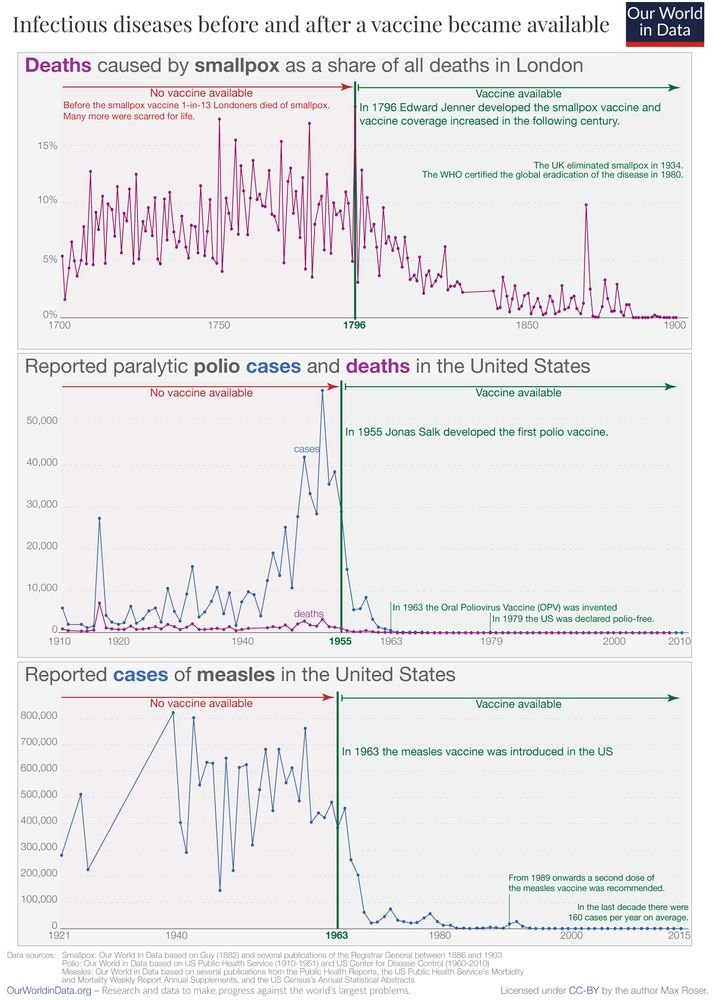
June 26, 2025 at 9:40 PM
My chart on the history of three infectious diseases — smallpox, polio, and measles — before and after a vaccine was available.
For the first time ever, China's CO₂ emissions are falling due to clean energy growth, rather than reduced power demand.
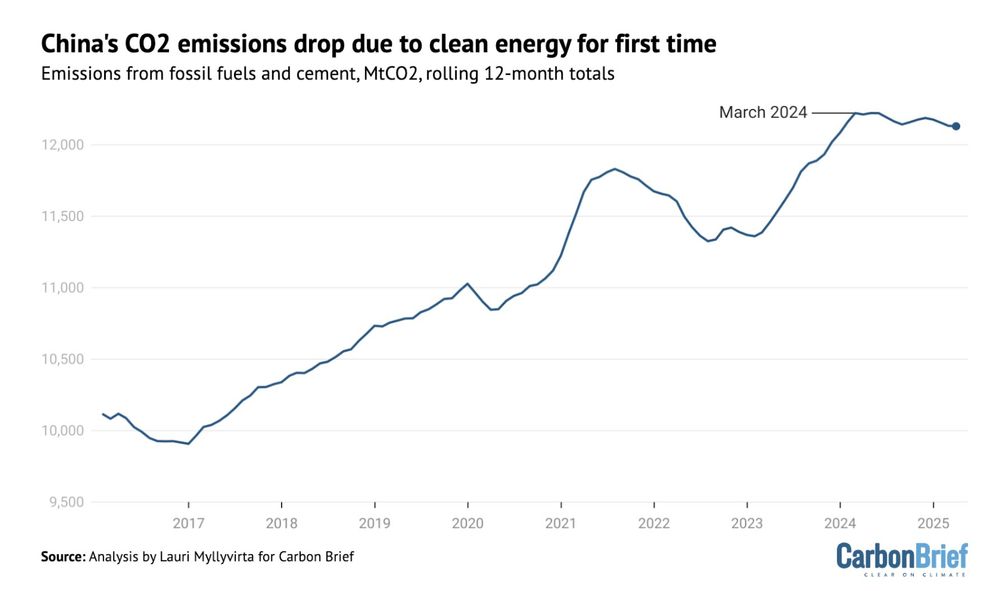
May 16, 2025 at 7:57 AM
For the first time ever, China's CO₂ emissions are falling due to clean energy growth, rather than reduced power demand.
A single dose cuts the chances of measles by about 95% — a second dose reduces the risk further.
How effective and safe are measles vaccines?
In her new article, my colleague @scientificdiscovery.dev summarized the findings of a Cochrane meta-analysis.
ourworldindata.org/measles-vacc...
How effective and safe are measles vaccines?
In her new article, my colleague @scientificdiscovery.dev summarized the findings of a Cochrane meta-analysis.
ourworldindata.org/measles-vacc...
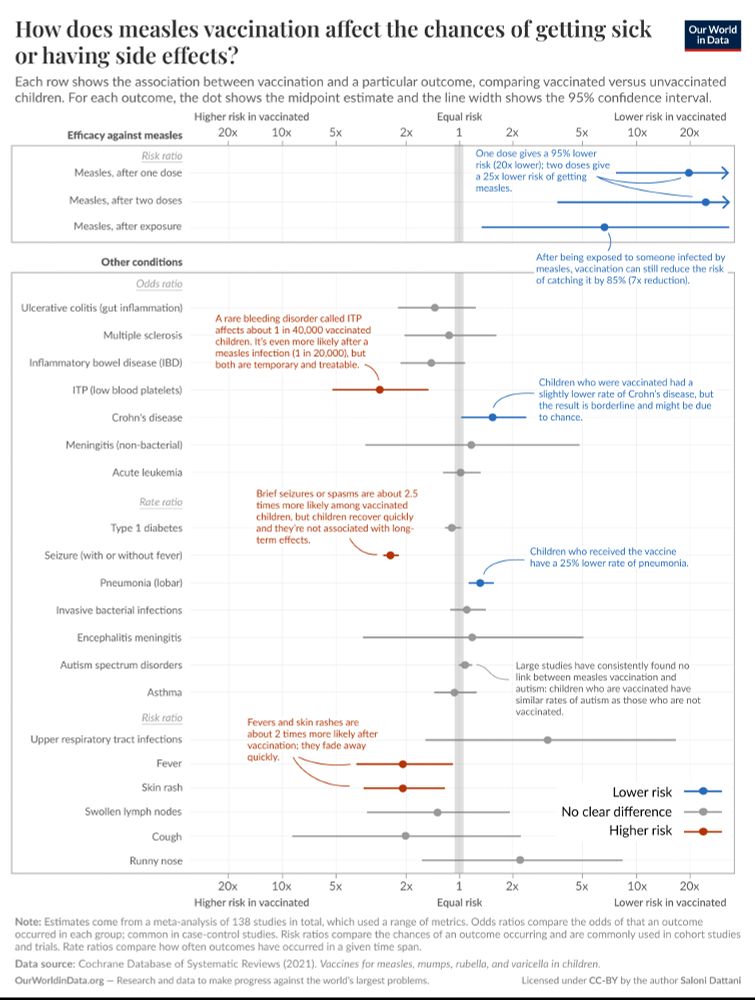
May 15, 2025 at 6:56 PM
A single dose cuts the chances of measles by about 95% — a second dose reduces the risk further.
How effective and safe are measles vaccines?
In her new article, my colleague @scientificdiscovery.dev summarized the findings of a Cochrane meta-analysis.
ourworldindata.org/measles-vacc...
How effective and safe are measles vaccines?
In her new article, my colleague @scientificdiscovery.dev summarized the findings of a Cochrane meta-analysis.
ourworldindata.org/measles-vacc...
In 2004, it took the world a year to add one gigawatt of solar power — now it takes a day.
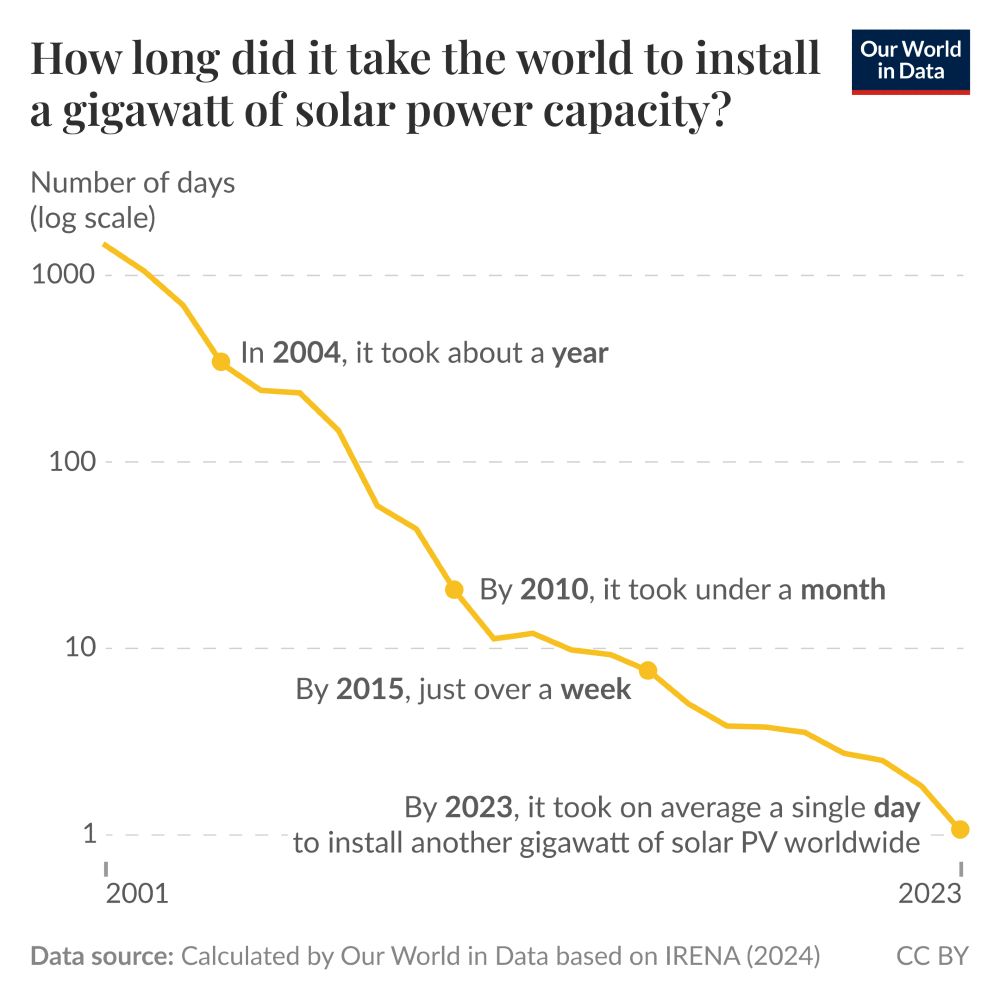
March 18, 2025 at 10:41 AM
In 2004, it took the world a year to add one gigawatt of solar power — now it takes a day.
One thing I admired Americans for was they provided efficient and effective aid for people around the world.
I thought this made America great.
The PEPFAR program saved plausibly about 25 million lives and prevented at least 5.5 million babies from being born with HIV.
See: pepfarreport.org
I thought this made America great.
The PEPFAR program saved plausibly about 25 million lives and prevented at least 5.5 million babies from being born with HIV.
See: pepfarreport.org
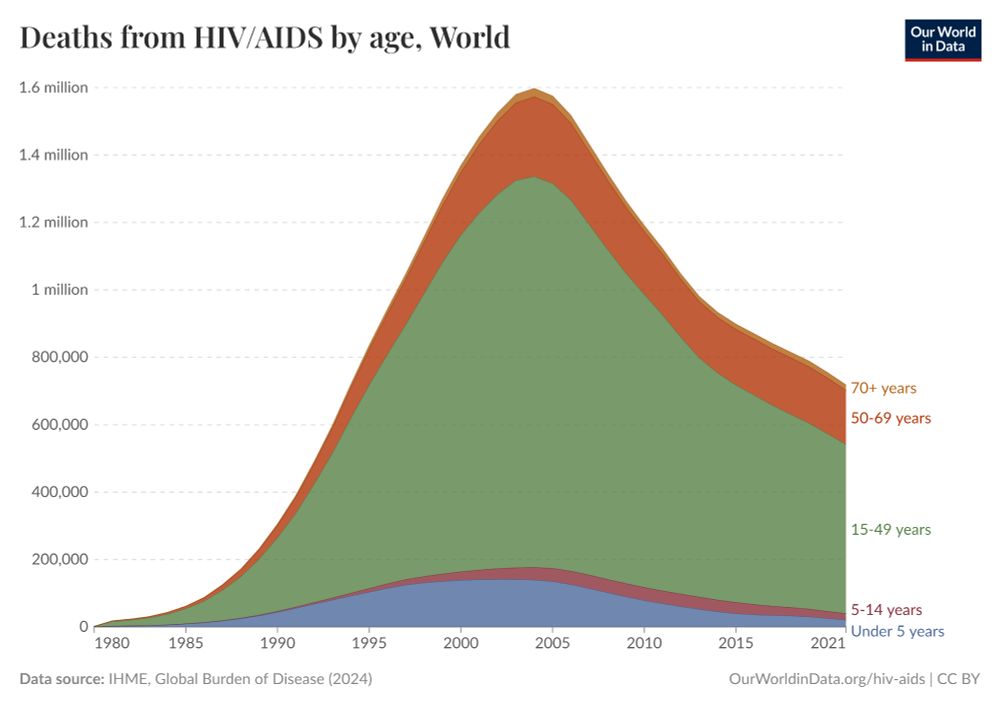
February 17, 2025 at 2:46 PM
One thing I admired Americans for was they provided efficient and effective aid for people around the world.
I thought this made America great.
The PEPFAR program saved plausibly about 25 million lives and prevented at least 5.5 million babies from being born with HIV.
See: pepfarreport.org
I thought this made America great.
The PEPFAR program saved plausibly about 25 million lives and prevented at least 5.5 million babies from being born with HIV.
See: pepfarreport.org
I am so very grateful to everyone at KU Leuven and UCLouvain for this extraordinary honour. Receiving an honorary doctorate is something I never would have imagined.
A huge thank you to all of the students and faculty at the two universities. I will never forget these days in Leuven.
A huge thank you to all of the students and faculty at the two universities. I will never forget these days in Leuven.



February 5, 2025 at 12:06 PM
I am so very grateful to everyone at KU Leuven and UCLouvain for this extraordinary honour. Receiving an honorary doctorate is something I never would have imagined.
A huge thank you to all of the students and faculty at the two universities. I will never forget these days in Leuven.
A huge thank you to all of the students and faculty at the two universities. I will never forget these days in Leuven.
Here are pages 3 and 4 in case you’d like to read it.
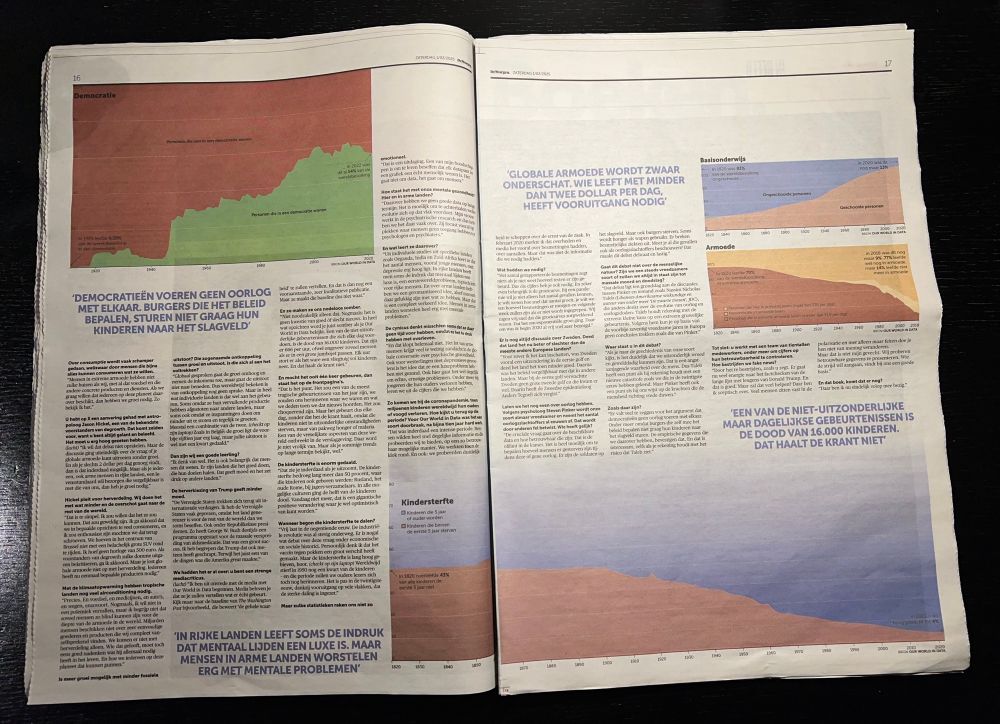
February 1, 2025 at 6:52 PM
Here are pages 3 and 4 in case you’d like to read it.
Earlier this week I did a long interview with the Belgian newspaper DeMorgen.
It’s out today. I just arrived in Belgium and found it at the newsstand. They illustrated it really nicely with some Our World in Data charts.
It’s out today. I just arrived in Belgium and found it at the newsstand. They illustrated it really nicely with some Our World in Data charts.
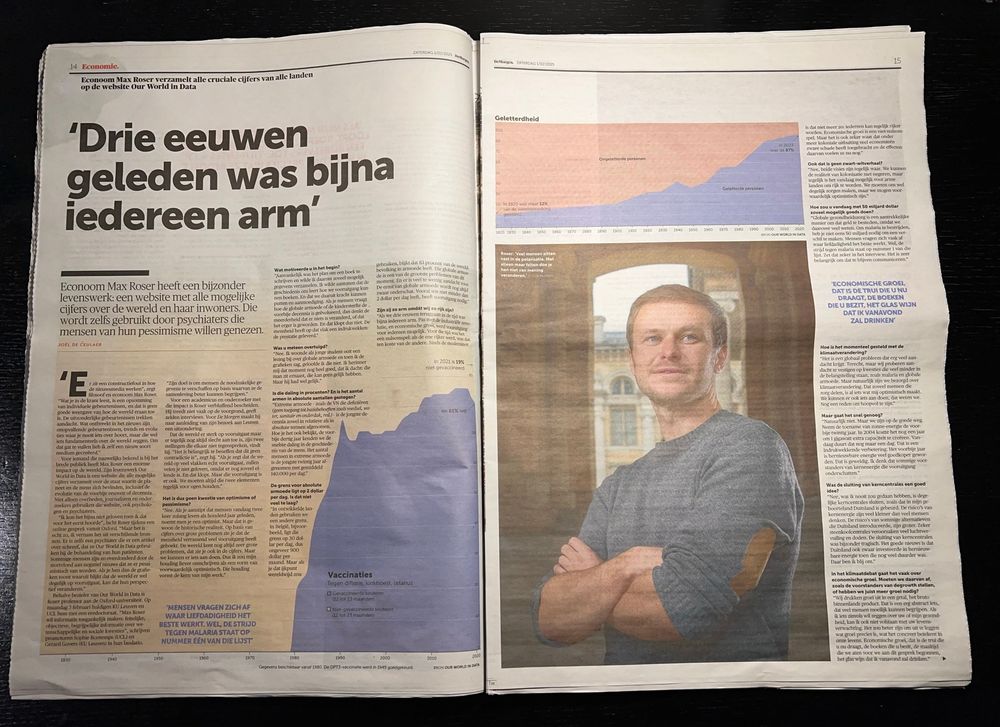
February 1, 2025 at 6:47 PM
Earlier this week I did a long interview with the Belgian newspaper DeMorgen.
It’s out today. I just arrived in Belgium and found it at the newsstand. They illustrated it really nicely with some Our World in Data charts.
It’s out today. I just arrived in Belgium and found it at the newsstand. They illustrated it really nicely with some Our World in Data charts.
apparently this gift link is not working — here is the full article in four screenshots:
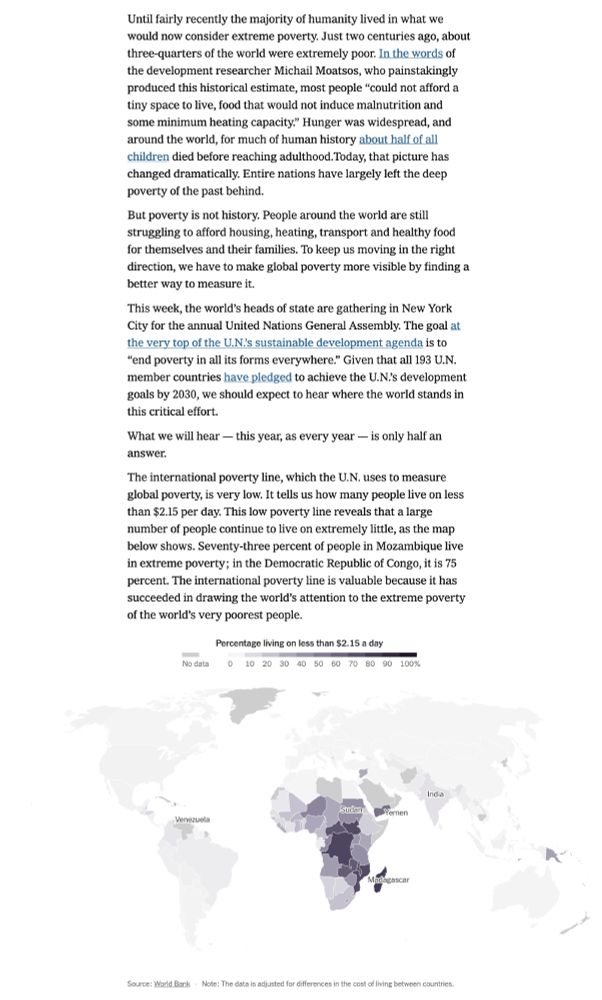
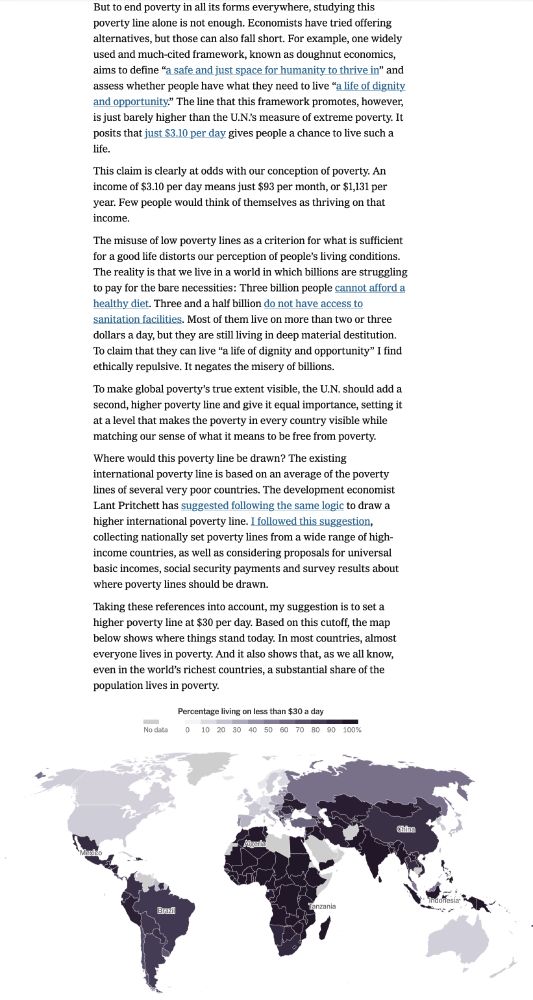
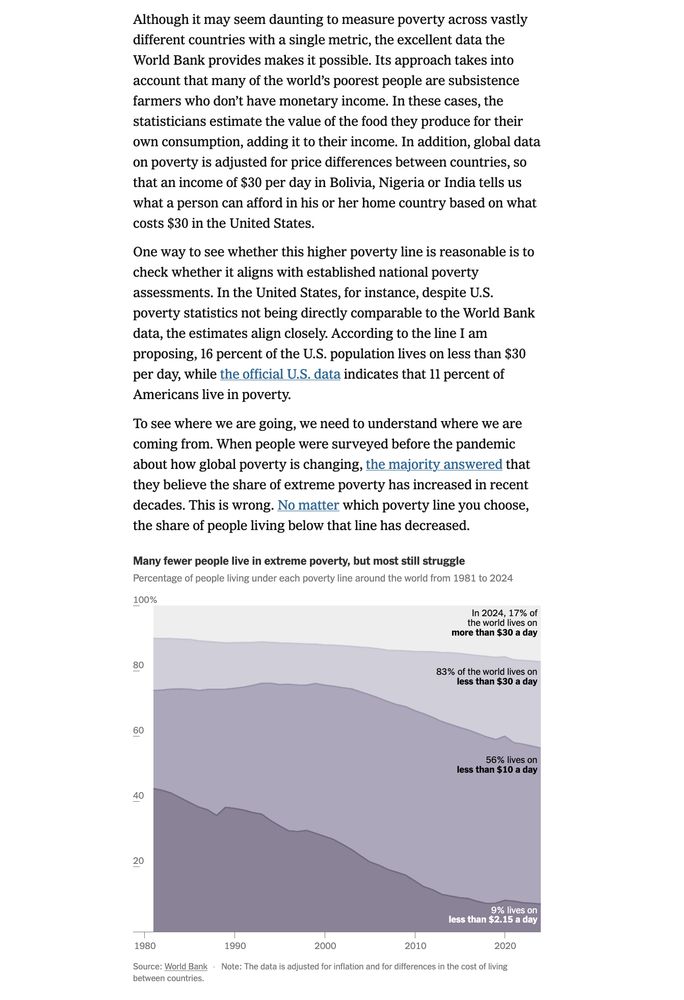
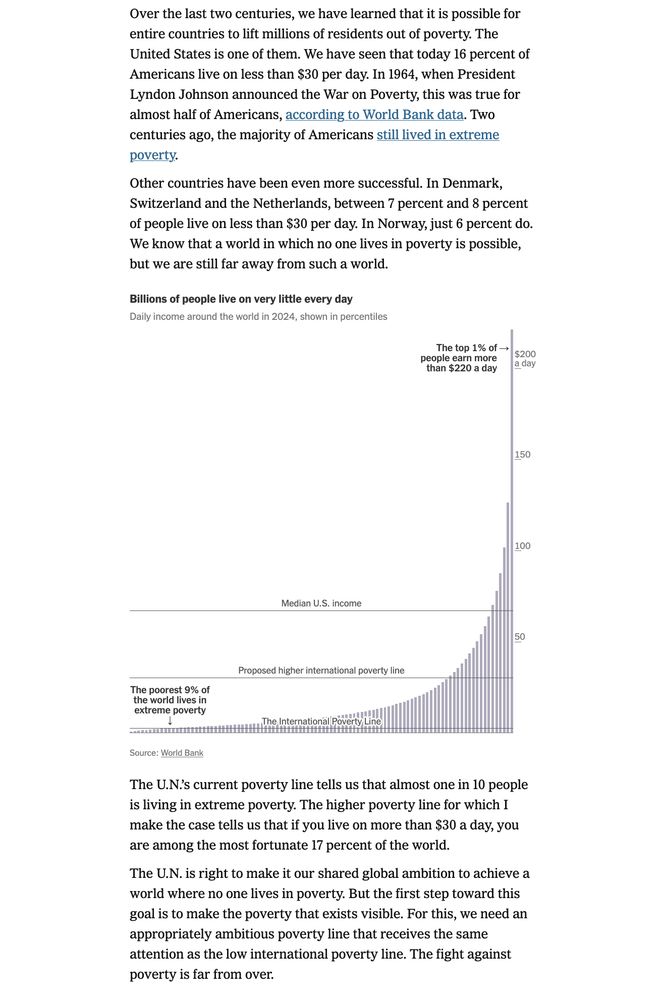
January 29, 2025 at 9:40 AM
apparently this gift link is not working — here is the full article in four screenshots:
Our Daily Data Insight today — the world has passed “peak child.”
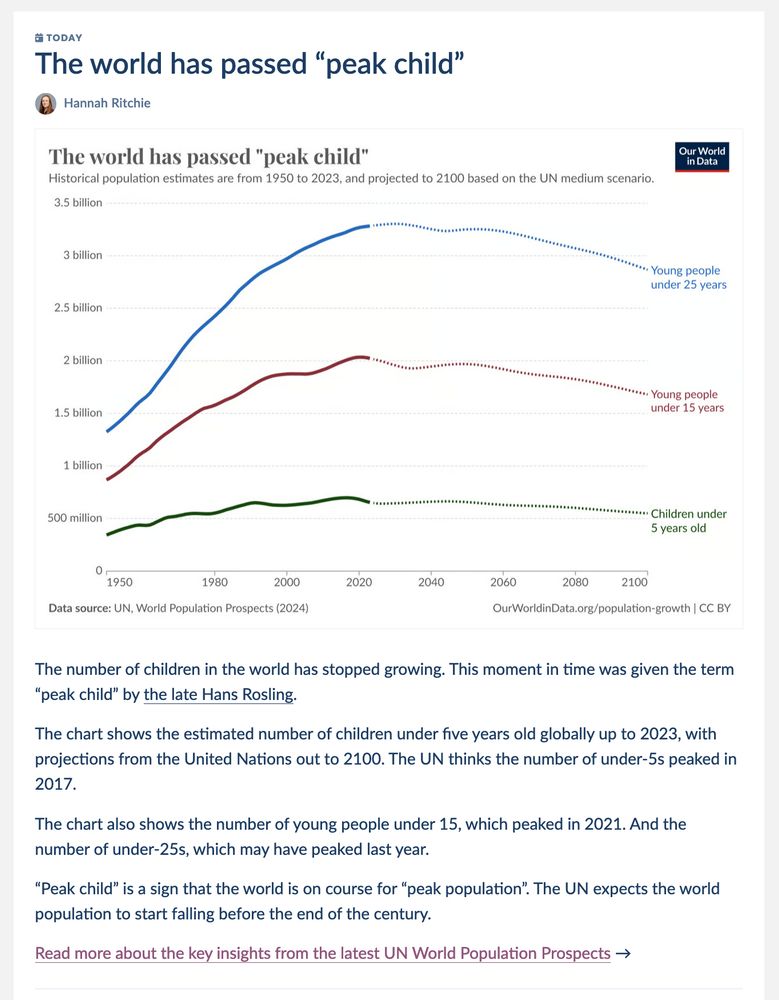
January 13, 2025 at 8:45 AM
Our Daily Data Insight today — the world has passed “peak child.”
Who would have won the 'Simon-Ehrlich bet' over different decades — and what do long-term prices tell us about resource scarcity?
The new Our World in Data article by my colleague Hannah Ritchie.
ourworldindata.org/simon-ehrlic...
The new Our World in Data article by my colleague Hannah Ritchie.
ourworldindata.org/simon-ehrlic...
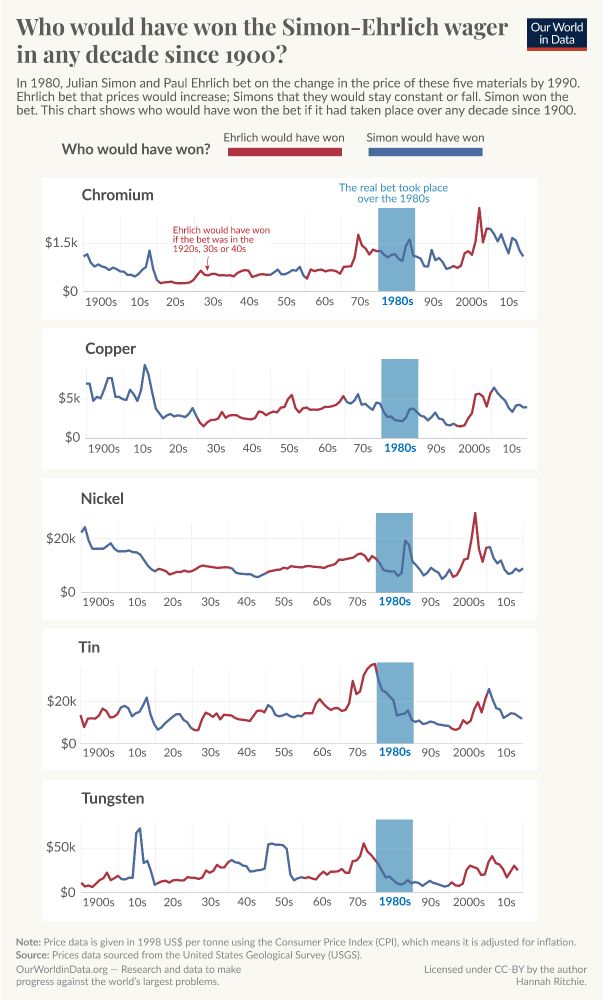
January 8, 2025 at 2:25 PM
Who would have won the 'Simon-Ehrlich bet' over different decades — and what do long-term prices tell us about resource scarcity?
The new Our World in Data article by my colleague Hannah Ritchie.
ourworldindata.org/simon-ehrlic...
The new Our World in Data article by my colleague Hannah Ritchie.
ourworldindata.org/simon-ehrlic...
We have just updated our long-term data on life expectancy around the world.
👇 The data by continent shows that life expectancy has more than doubled in every world region.
(Here is all our work on life expectancy: ourworldindata.org/life-expectancy)
👇 The data by continent shows that life expectancy has more than doubled in every world region.
(Here is all our work on life expectancy: ourworldindata.org/life-expectancy)

December 8, 2024 at 8:07 PM
We have just updated our long-term data on life expectancy around the world.
👇 The data by continent shows that life expectancy has more than doubled in every world region.
(Here is all our work on life expectancy: ourworldindata.org/life-expectancy)
👇 The data by continent shows that life expectancy has more than doubled in every world region.
(Here is all our work on life expectancy: ourworldindata.org/life-expectancy)
My new, very brief article is about economic growth — highlighting nine countries in Africa where incomes have more than doubled since 1990.
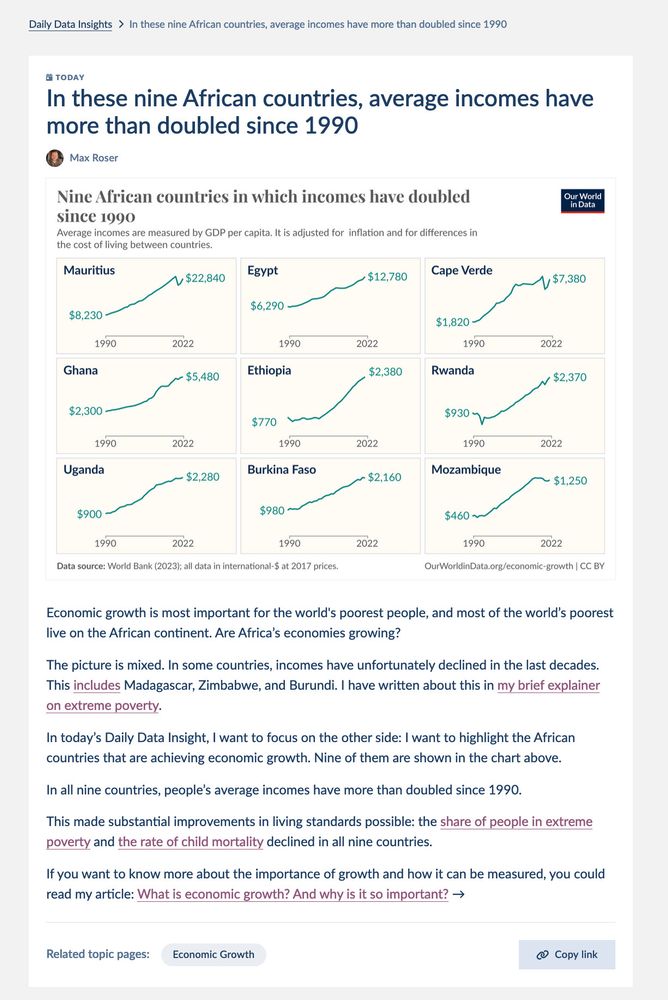
November 28, 2024 at 4:46 PM
My new, very brief article is about economic growth — highlighting nine countries in Africa where incomes have more than doubled since 1990.
Few people even know about this; when people are asked in surveys how child mortality has changed the majority says it has stagnated or increased.
If you consider that many don't know about humanity's biggest achievement, then it's not surprising that many are so pessimistic about our future.
If you consider that many don't know about humanity's biggest achievement, then it's not surprising that many are so pessimistic about our future.
November 27, 2024 at 6:18 PM
Few people even know about this; when people are asked in surveys how child mortality has changed the majority says it has stagnated or increased.
If you consider that many don't know about humanity's biggest achievement, then it's not surprising that many are so pessimistic about our future.
If you consider that many don't know about humanity's biggest achievement, then it's not surprising that many are so pessimistic about our future.
Hey Tamar! Nice to see you here!
You can explore the data country by country here: ourworldindata.org/grapher/diet...
Yes, as you say it's often countries that left the worst poverty behind (and to a lesser extent some higher-income countries too).
You can explore the data country by country here: ourworldindata.org/grapher/diet...
Yes, as you say it's often countries that left the worst poverty behind (and to a lesser extent some higher-income countries too).

November 25, 2024 at 9:51 PM
Hey Tamar! Nice to see you here!
You can explore the data country by country here: ourworldindata.org/grapher/diet...
Yes, as you say it's often countries that left the worst poverty behind (and to a lesser extent some higher-income countries too).
You can explore the data country by country here: ourworldindata.org/grapher/diet...
Yes, as you say it's often countries that left the worst poverty behind (and to a lesser extent some higher-income countries too).
The world population grew fast over the last 60 years, but farmers grew fruits and vegetables even faster
This is my @ourworldindata.org Data Insight today: ourworldindata.org/data-insight...
This is my @ourworldindata.org Data Insight today: ourworldindata.org/data-insight...

November 25, 2024 at 9:11 PM
The world population grew fast over the last 60 years, but farmers grew fruits and vegetables even faster
This is my @ourworldindata.org Data Insight today: ourworldindata.org/data-insight...
This is my @ourworldindata.org Data Insight today: ourworldindata.org/data-insight...

